
by Sam Dunaiski | Aug 31, 2022 | Advocacy, Biogas, Electrification, Energy Storage, Geothermal, Hydroelectric, Renewables, Solar, Wind
The world of clean energy received a monumental win earlier this month with the passage of the Inflation Reduction Act. The Inflation Reduction Act (IRA) will be the backbone of the United States’ effort to decarbonize our energy sector, spur clean energy implementation across all demographics, and significantly grow the clean energy economy.
Here is a breakdown of the bill’s elements:
Renewable Energy Generation
Investment Tax Credits
- Residential Solar: 30% Investment Tax Credit (ITC) on project costs until the end of 2032, with a step-down of 26% in 2033 and 22% in 2034. Credits are retroactive for residential installations from 1/1/2022, meaning that homeowners who installed a solar array at any point in 2022 will qualify for the 30% ITC.
- Commercial Solar: 30% ITC on project costs until the end of 2024 (ITC on commercial solar is also retroactive to 1/1/2022). Beginning in 2025, the ITC will be replaced by technology-neutral credits, with the following rules in place:
- 6% base credit; bonus credits up to 30% of costs if the project meets union labor, prevailing wage, and apprenticeship requirements. These requirements do not apply to projects less than 1 megawatt (MW) in size.
- 10% bonus credits if the project meets domestic content requirements.
- 10% bonus credits if the project is sited in an “energy community” – a brownfield site or a community with a recent coal plant closure.
- 10% bonus credits if the project is sited in a low-income community. This only applies to projects that are 5 MW and less.
- 20% bonus credits if the project qualifies as directly serving a low-income residential facility or another economic benefit system.
- Interconnection costs -for projects less than 5 MW- with the utility can be included in the credits.
Production Tax Credits
While the Investment Tax Credit applies to the upfront purchase of parts, materials, and labor, the Production Tax Credit (PTC) functions differently. This credit is a direct payment and applies to the production or output of the generation source. This generation source can be solar, wind, geothermal, biomass, and hydropower, to name a few. These credits are also retroactive from 1/1/2022.
Here is how the PTC breaks down:
- Direct pay value: $0.026 per kilowatt-hour (kWh) starting in 2022; rate rises with inflation.
- Bonus credit of 1.5 cents/kWh if union labor, prevailing wage, and apprenticeship requirements are met.
- 10% bonus credits if domestic content requirements are met.
- 10% bonus credits if the project is sited in an “energy community” – a brownfield site or a community with a recent coal plant closure.
- The PTC is available for nonprofits, state and local governments, rural electric cooperatives, tribal governments, and/or other tax-exempt entities. These organizations previously did not qualify for the ITC.
- PTC will also apply to utility-scale projects.
- Credits are available for ten years after the project is placed into service.
- Direct pay/PTC is not available for residential solar installations.
- PTC is transferable after 2022; however not for individual taxpayers.
- Commercial solar projects can choose either the ITC or the PTC.
Electric Vehicles
New EVs: (Effective 8/16/2022)
- $7,500 tax credit to be divided into two separate credits:
- $3,750 credit for electric vehicles with batteries produced in North America.
- $3,750 credit for electric vehicles using a certain percentage of critical battery minerals extracted or processed in the U.S.
- Vehicles meeting only one requirement will only be eligible for a $3,750 credit.
- Vehicles must cost less than:
- Vans < $80,000
- Pickups and SUVs < $80,000
- Cars < $55,000
- Income requirements:
- Joint tax return < $300,000
- Head of household < $225,000
- Single-payer < $150,000
- Credit will eliminate the limit of 200,000 vehicles per manufacturer.
Commercial Clean Vehicles: (Effective 01/01/23)
- Up to $40,000 tax credit for commercial electric vehicles.
Used EVs: (Effective 01/01/2023)
- $4,000 tax credit or 30% of the vehicle’s sale price.
- The vehicle’s model year must be at least two years older than the current “new” model year.
- Vehicle cost must be less than $25,000.
- Income requirements:
- Joint tax return <$150,000
- Head of household <$112,300
- Single-payer <$75,000
- Used EV tax credits will continue until the end of 2032.
EV-Charging:
- Credits for EV-charging equipment and infrastructure will increase up to $100,000.
- Equipment must be located in a qualified census tract, with similar bonus credits if prevailing wage and apprenticeship requirements are met.
- A direct pay or PTC option is available for charging with transferrable credits.
- Credits will be available until 2032.
Battery Storage
Effective as of 1/1/2023
- 30% ITC for the cost of installation; credits last until 2033. To qualify, batteries must be larger than 3kWh for residential installations and larger than 5kWh for commercial installations.
- Commercial battery credits have similar sliding scales as other ITC items: baseline of 6% with increasing credits for prevailing wage, labor, location, etc.
- Battery storage systems will no longer need to be coupled with solar generation systems to qualify for tax credits.
Energy Efficiency and Electrification
Effective as of 1/1/2023
Federal Tax Credit
- Heat Pumps: 30% of costs, up to $2,000
- Electric Upgrades: 50% of costs, up to $1,200/year
Upfront Discounts
- Incentive levels and eligibility are determined by income
- Heat Pumps: rebates for up to $8,000
- Electric Upgrades: up to $4,000 for breaker boxes/electric service; $2,500 for wiring, and $1,600 for insulation/venting/sealing
Manufacturing and Production
Effective as of 1/1/2023
- $30 billion in PTC to manufacture solar panels, trackers, inverters, wind turbines, batteries, and other critical minerals.
- Solar PV cells – $0.04/watt
- Solar-grade polysilicon – $3/kg
- Solar modules – $0.07/watt
- Wind components – 10% of the sales price
- Battery cells – $35/kWh
- Critical minerals – 10% of the cost of production
- $10 billion in ITC funding for building new facilities to manufacture clean energy products; $4 billion of these funds must be allocated to “energy communities.”
- $500M for manufacturing heat pumps and processing of critical minerals necessary for heat pump production.
Other Items
- Carbon Sequestration Credits (ITC or PTC) for facilities that begin construction before 2033 and provide direct air capture of carbon dioxide. Credits will be issued by a metric ton of carbon capture.
- Clean Hydrogen – credits for production -by unit- of green and blue hydrogen that can be used to offset traditionally carbon-based fuels.
- Sustainable Aviation Fuel – credits for SAF produced by unit (gallon) with increasing credits based on a percentage of greenhouse gas reduction.
- Biodiesel/Alternative Fuels – production credits for fuels produced based on life-cycle emission levels.
- Methane Fees – fees imposed by EPA for facilities that emit more than 25,000 metric tons of CO2 annually.
Additional Provisions
- $500 million for the Defense Production Act, some of which could be used for solar manufacturing.
- Greenhouse Gas Reduction Fund totaling $29 billion overseen by the Environmental Protection Agency.
- Climate Pollution Reduction Grants to state and local governments totaling $5 billion.
- Environmental and Climate Justice Block Grants: $3 billion for disadvantaged communities.
- $2 billion in loan authority for new transmission construction in designated national interest corridors.
- $760 million for the Department of Energy to issue grants to state, local or tribal entities to facilitate siting of high-voltage interstate transmission.
- Additional $1 billion for rural renewable energy electrification loans and expansion of the program to include storage.
- Additional $1 billion for Rural Energy for America Program (REAP), with total grants limited to 50% of the total cost of an eligible project.
- $9.6 billion for loans and financing for rural co-ops to purchase renewable energy, generation, zero-emission systems, and related transmission, limited to 25% of total cost.
- Incentives for build-out of electric vehicle charging networks.
- Extension, expansion, and changes to electric vehicle tax credits, including a new credit for purchasing used EVs.
Conclusion
Much of the implementation and administration of the Inflation Reduction Act is still not understood. This document is meant to summarize the items in the bill that RENEW Wisconsin considers particularly important to the clean energy transition in our state.
For additional information, please utilize the following resources:
Please contact Sam Dunaiski (sam@renewwisconsin.org) with questions.
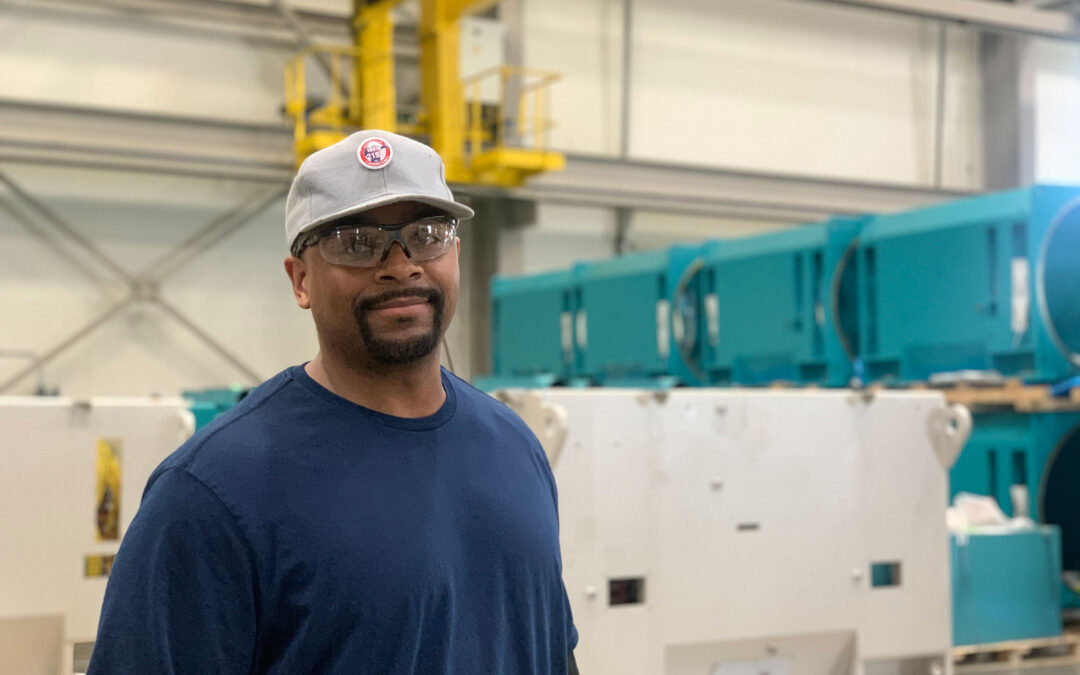
by Jodi Jean Amble | Jun 1, 2022 | Clean Energy Works, Hydroelectric, Jobs, Renewables, Solar, Wind
Akinlana Abdalla is tall and self-assured with a gentle, almost playful demeanor. He was “the kid who always got in trouble for taking his toys apart to see how they worked.” This curiosity and innate engineering mind make him particularly good at his job as a Wind Turbine Repair Specialist at Ingeteam in Milwaukee, WI, where teams of engineers and technicians specialize in supporting solar, wind, hydro, and other renewable energy products.
Akinlana was born in Milwaukee, where he now lives with his wife and children. He has an extensive background in commercial construction and is a Journeymen Carpenter by trade. His career took him from deep tunnel mining through Laborers’ Local 113 to building bridges for Zenith Tech, later starting a business with his wife, and eventually earning an undergraduate degree in general management. He was attracted to Ingeteam because he wanted to move away from management and get back to a more “hands-on” work environment aligned with his values.
Ingeteam is a global renewable energy solutions company. Their 140,000 square-foot state-of-the-art production facility in Milwaukee is the only place in the United States where wind turbines are built by an American workforce.
Ingeteam customers send wind turbine generators that cannot be repaired up the tower. Akinlana and his team perform mechanical and electrical diagnostics on the generators to determine their failure. Ingeteam then submits a report to the customer and a cost estimate for the needed repairs. If the customer decides to move forward with the repairs, Akinlana and his team “repair it and send it back to the customer like new,” adhering to the Code of Excellence established by IBEW 2150.
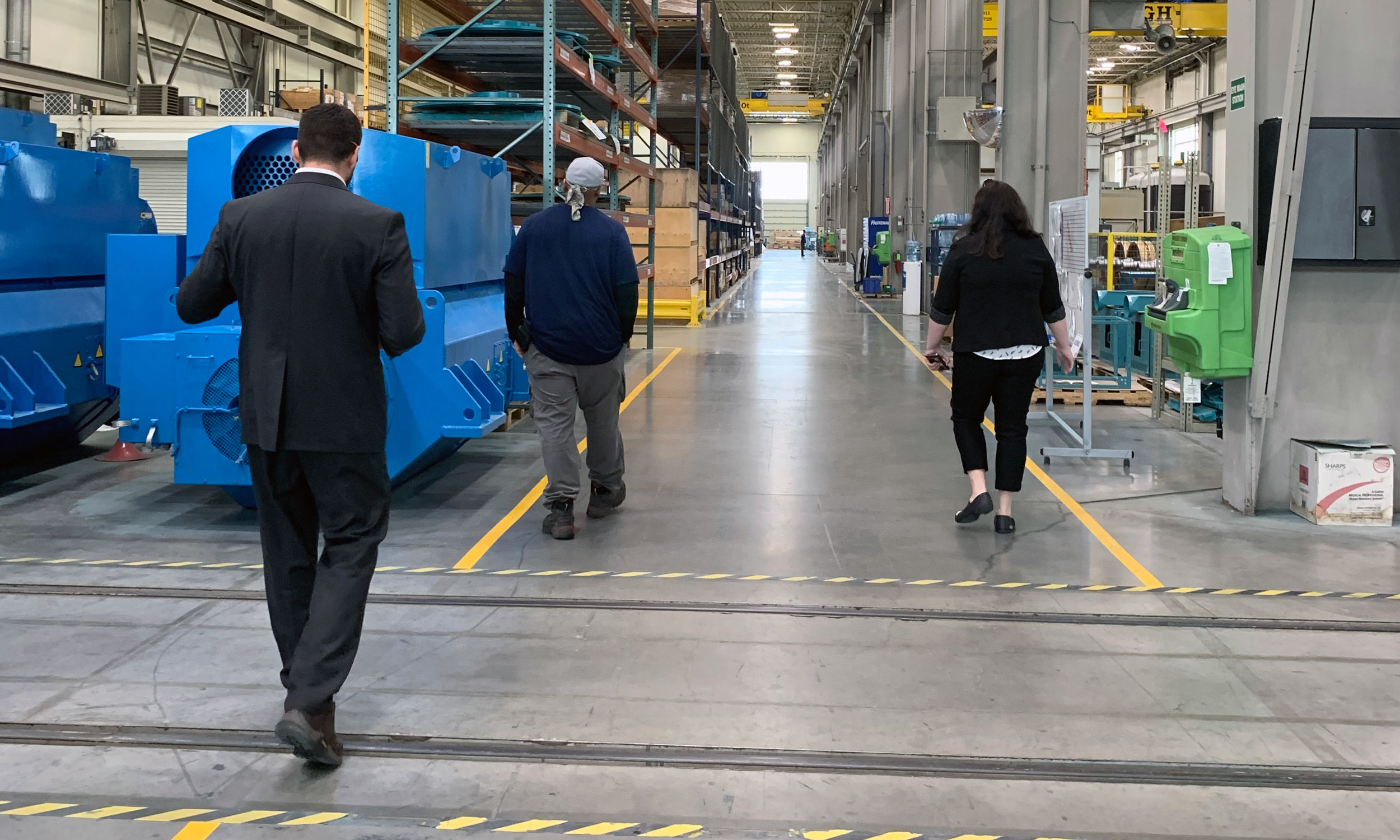
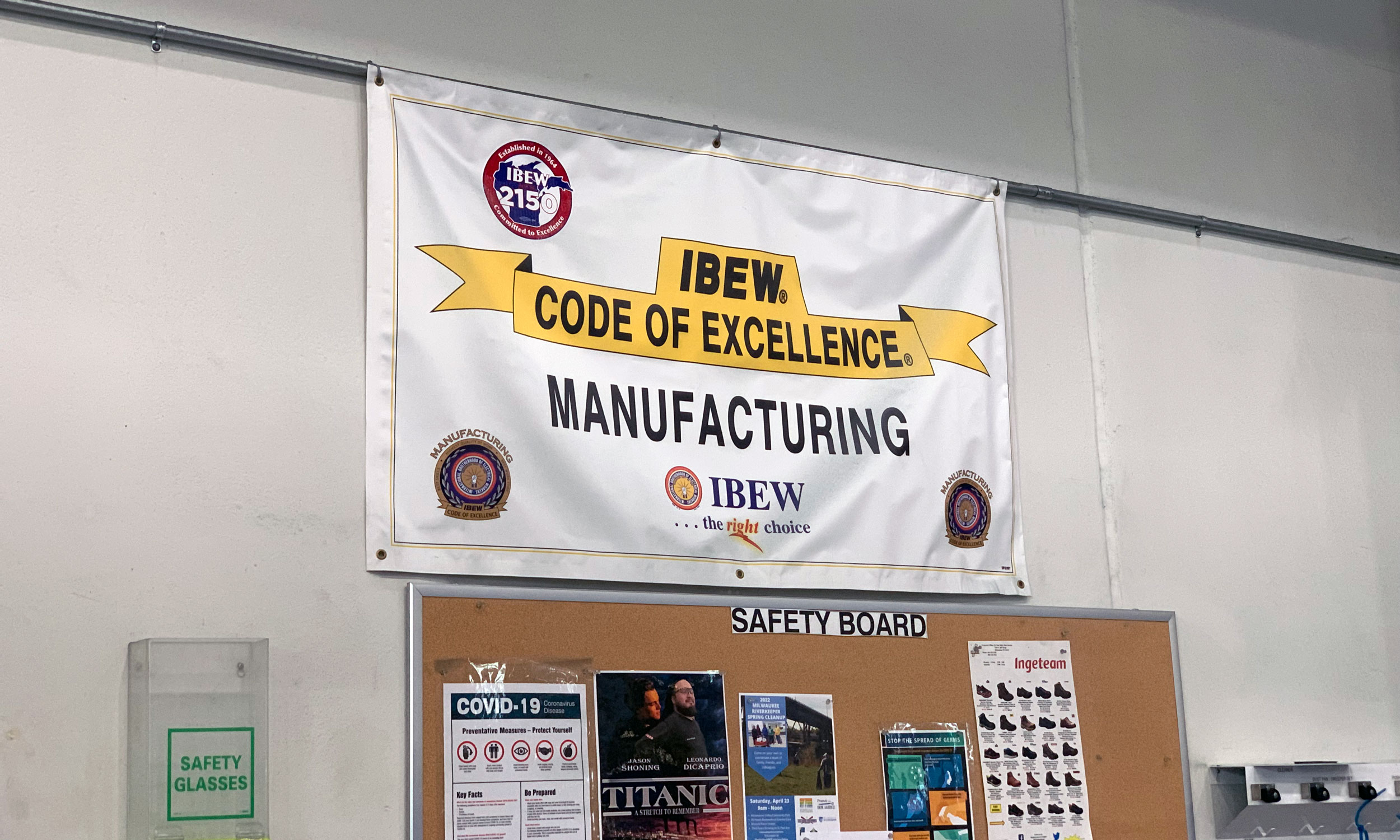
“You never know what you’re going to get,” Akinlana said. “There’s no monotony. Every day is something different. We could get the same [generator] models coming in on one truck, but all of them will have different issues. When we open it up, it’s just fun trying to get to the bottom of what the root cause of a failure is.”
While it seems as if Akinlana was born to do this work, he thinks his success is determined by having a positive attitude and complementing it with aptitude.
“If you have a good attitude, that’s 90% of it,” he said. “Developing your mechanical aptitude and other skills to complete a repair is something that can be taught. But it starts with just having a can-do attitude and just appreciating the opportunity to be able to do what you do.”
His passion for his work extends beyond his enjoyment of taking things apart and then putting them back together. Akinlana has a deep sense of the impact of his work.
“Ingeteam provides something imperative for preserving and conserving the future environment, not only for ourselves but for our children and generations to come,” he said. “Because we know that we have not learned to discipline ourselves from gluttonous consumption, we have to have green energy.”
“This job aligns with my personal social responsibility.” Akinlana continued. “It’s nice to work for an entity where you share a passion for ensuring that we preserve our environment. Being an avid outdoorsman, being out in nature with my children, fishing, and hiking, it’s important to me that I give back. To be able to work doing something that allows me to do that, I think is absolutely profound.”
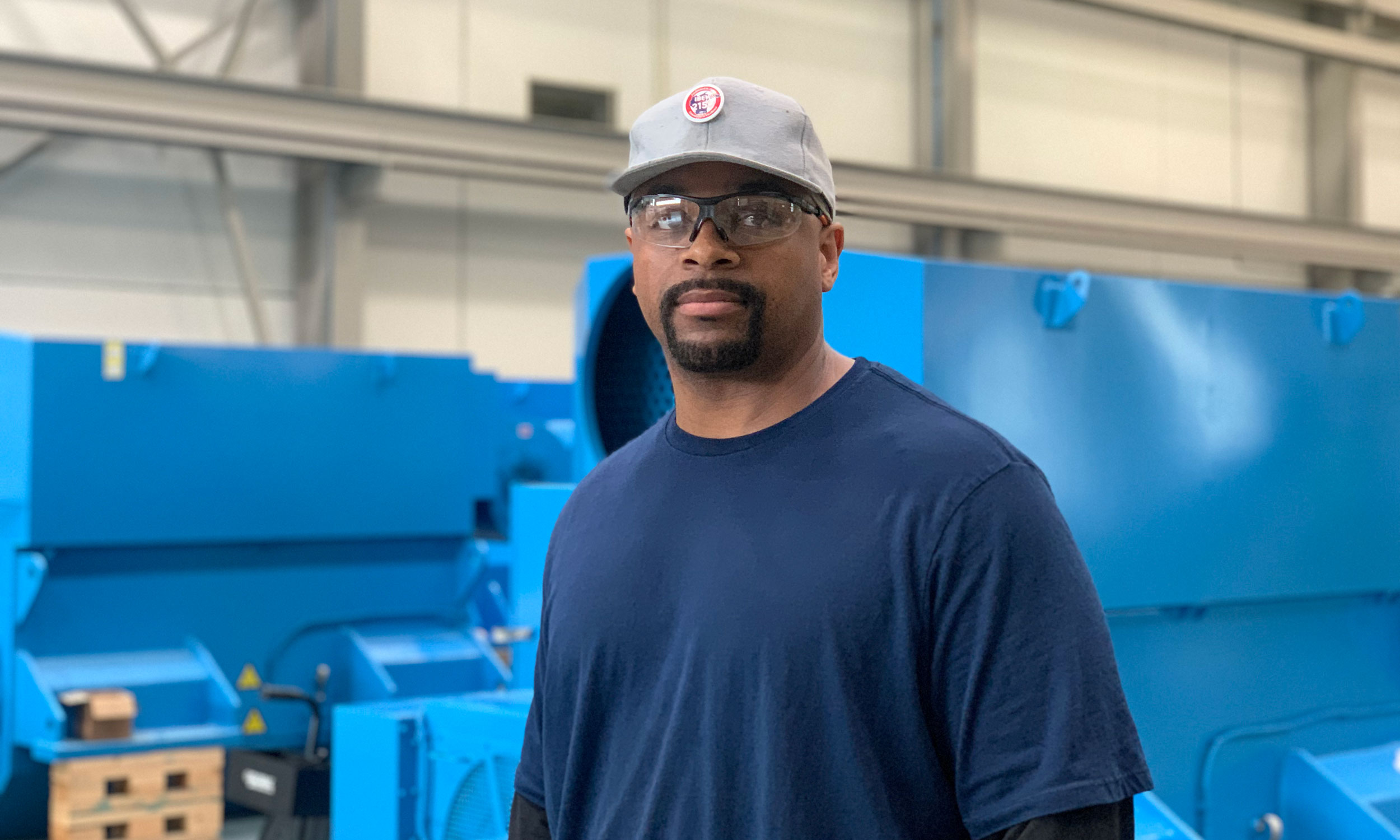
His team appreciates his passion and skills. Garan Chivinski is the Human Resources Manager at Ingeteam and the one who introduced him to RENEW Wisconsin.
“He’s a wealth of knowledge,” Garan said. “We’re seeing a time when those units [wind turbine generators] are coming back in, and they need to be serviced. They need some love and care to renew themselves and not create excess waste that they weren’t intended to create. AK [Akinlana] has really led that here for us, to get absolutely every single last spin, every single last value out of that resource possible for our customers and for the community. That’s why when you asked about somebody who might be your boots on the ground, somebody who’s the future of the wind industry in Wisconsin, this is the guy.”
Akinlana IS a wealth of knowledge. He’s also the kind of person who considers his work and actions and their effect on the world. This kind of thoughtfulness and passion is inspiring, and it’s easy to see why he is so respected and valued at Ingeteam.
“It’s nice to watch Elon Musk trying to fly off into another part of space,” Akinlana added. “But ultimately, when you see them go up in the rocket, you’re just going into another part of where you already are. Interesting, right? The reality is that we have this one small globe to live on, and no amount of money will get you away from that reality. Even if you set up something on Mars, you would have to come back here to get resources to live off of there. We have this [Earth], and we have to take care of this. Our level of consumption without trying to curb the adverse effects is damaging for the future. So that’s why this work is really, really important to me. I enjoy it every day. It’s not even work, not work at all.”
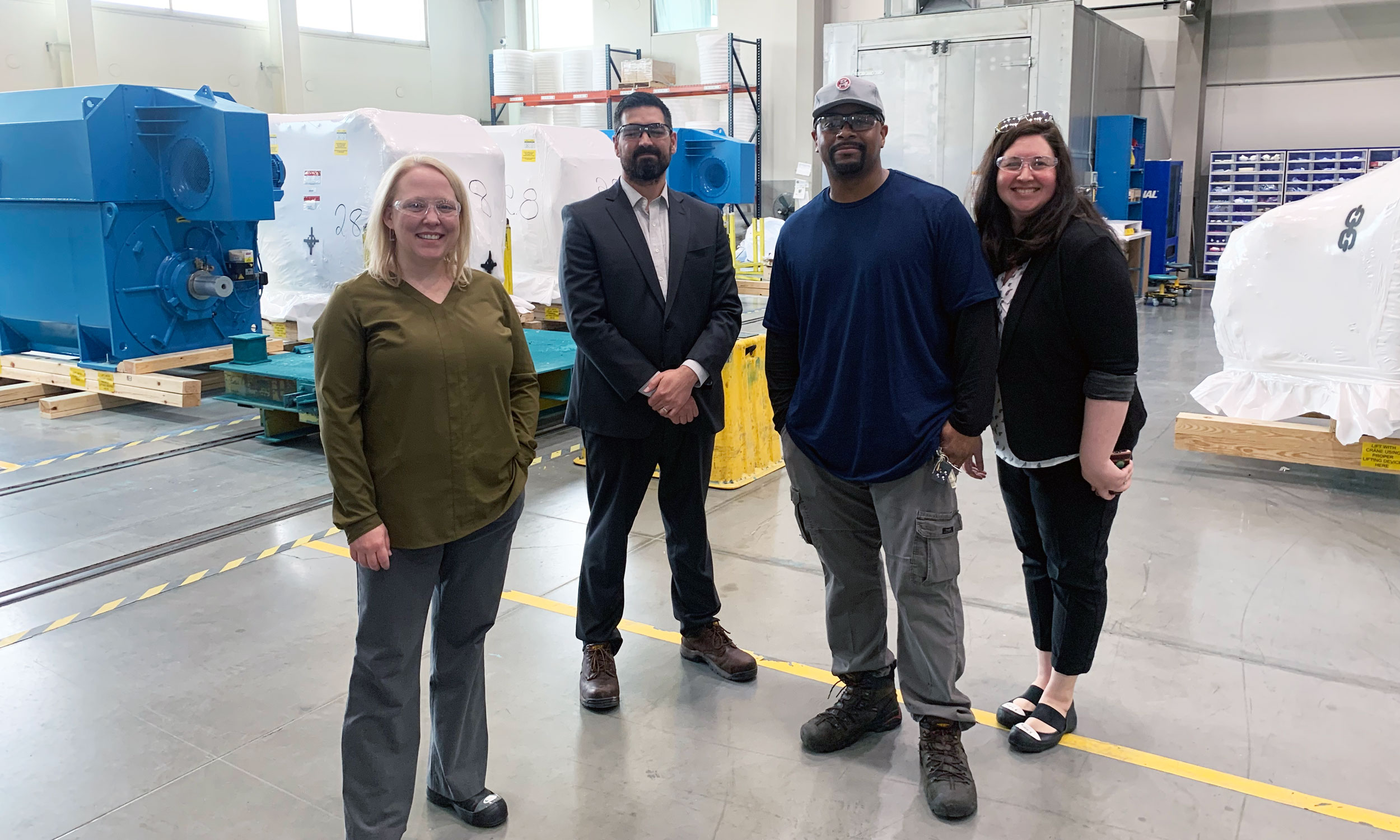
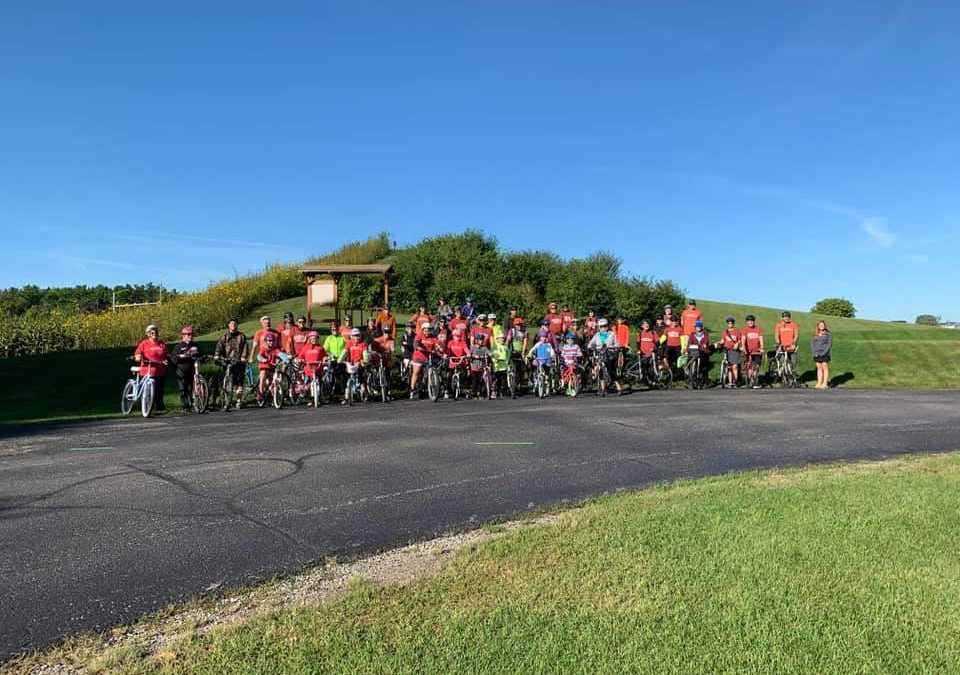
by Tyler Huebner | Sep 30, 2019 | Community, Electric Vehicles, Events, Geothermal, Hydroelectric, RENEW Wisconsin, Renewables, Solar, Wind
On Saturday, September 14th, our 7th Annual “Ride with RENEW” bike ride, held in the Fox Cities this year, was a huge success!
We started the morning at Prairie Hill Park in Grand Chute with 40 determined bike riders and 12 wonderful young ladies from the Girl Scouts of the Northwest Great Lakes! The State Representative for the area, Amanda Stuck, welcomed our riders by talking about the importance of energy, and how easy it has become to take advantage of clean energy sources.
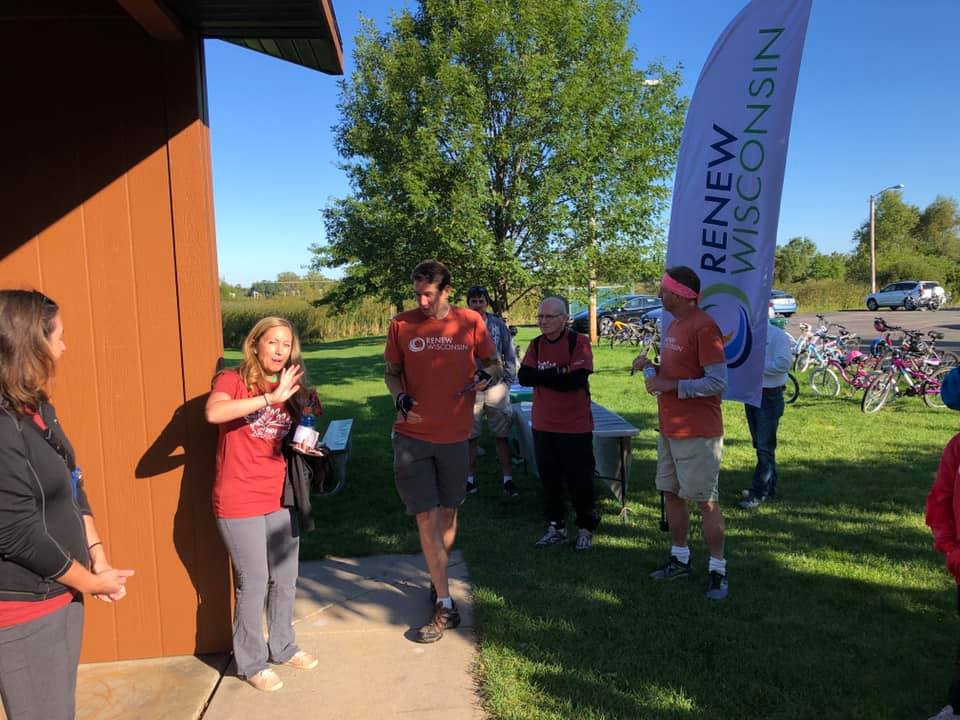
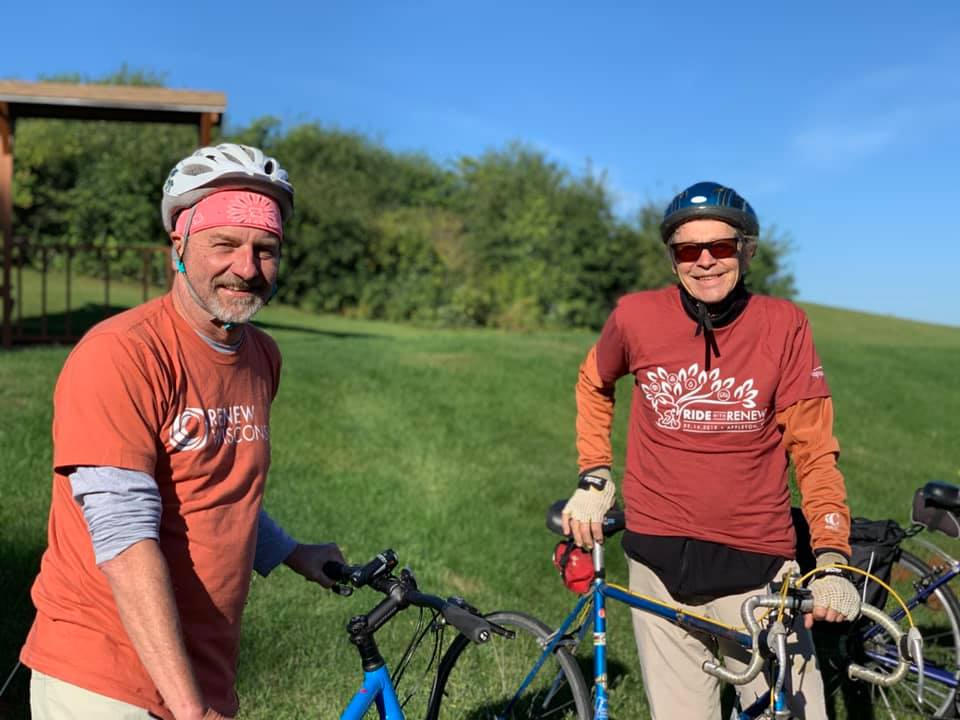
Our bike riders and Girl Scouts then set out for the Bubolz Nature Center where we explored their solar panels and microgrid, built and operated by Faith Technologies, who walked us through this one-of-a-kind facility in Wisconsin. The microgrid includes a lithium battery, a hydrogen fuel cell, and a generator, and the facility runs off the solar panels and renewable storage most of the time.
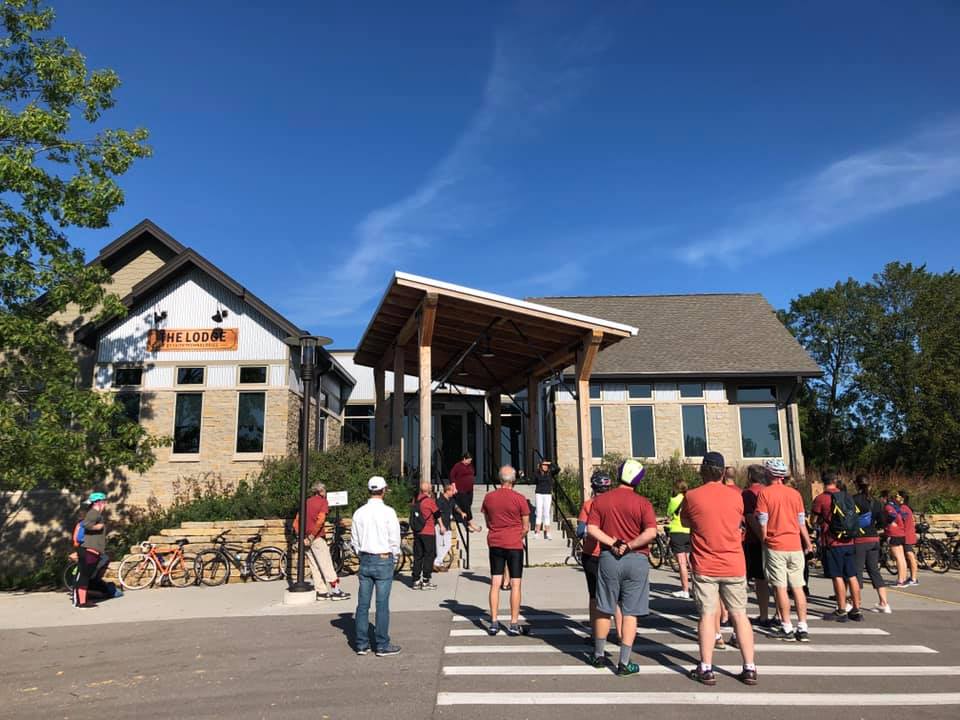
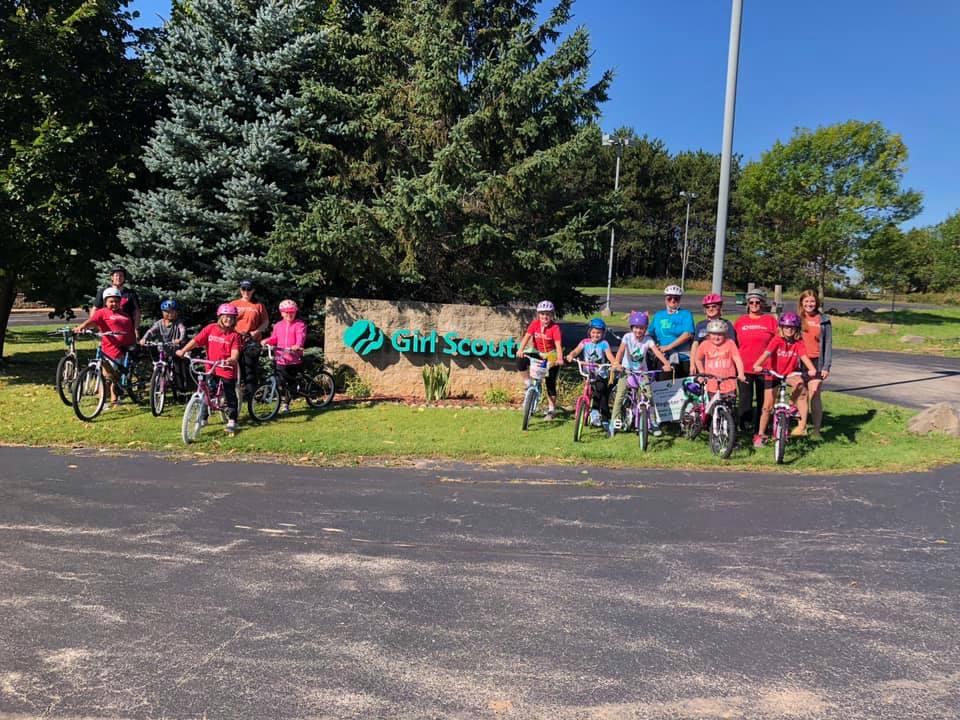
Next we biked 10 miles to Evergreen Credit Union which has become a regional leader in sustainability. With solar panels covering its roof, Roni Kasperek of Evergreen described the credit union’s migration to becoming a clean energy leader and how sustainability is a core value of the organization.
We turned Schildt Park into a clean energy mecca at lunch! Featuring pizza from Glass Nickel Pizza, we were fortunate to have the Ripon Lego League join us as they collected data from our bike riders to help them with their Lego challenge of designing a sustainable community! Our riders engaged in the Lego League’s survey, created to help the kids better understand bikers’ safety needs and how a city could better support bicycling. The Lego League kids did a great job helping to serve lunch and engage with our bikers!
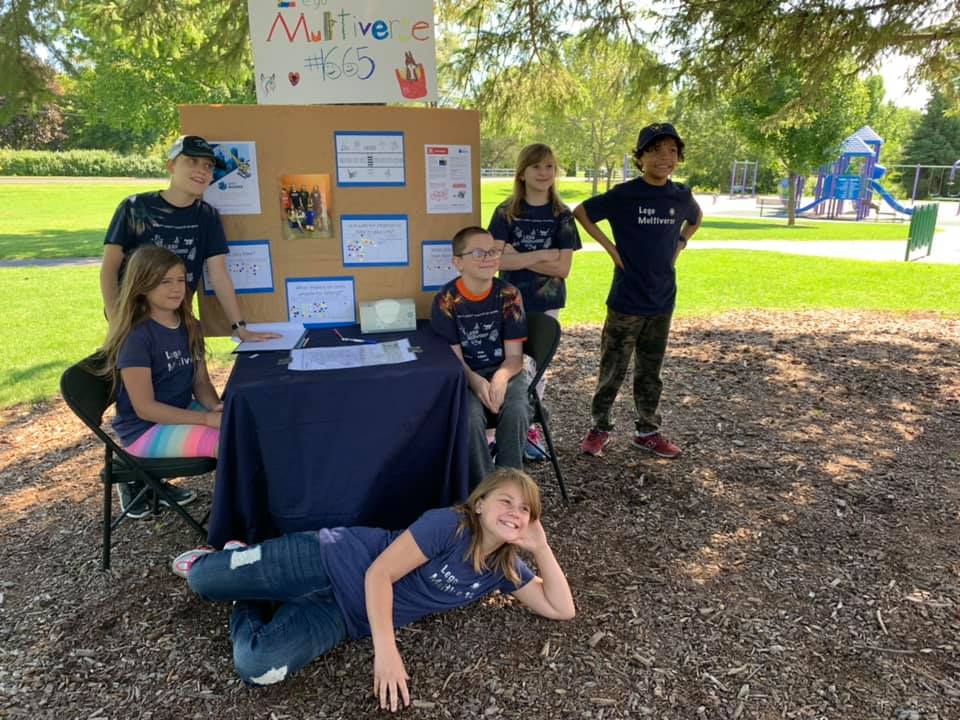
In addition, we had an electric vehicle exposition featuring 9 vehicles from 5 car brands that drive with electricity, instead of gasoline. This technology is advancing and many new types of affordable electric vehicles are coming out soon. We loved showing these cars off to our bike riders and a few members of the public, and the vehicle owners loved chatting about how much they enjoy driving electric.
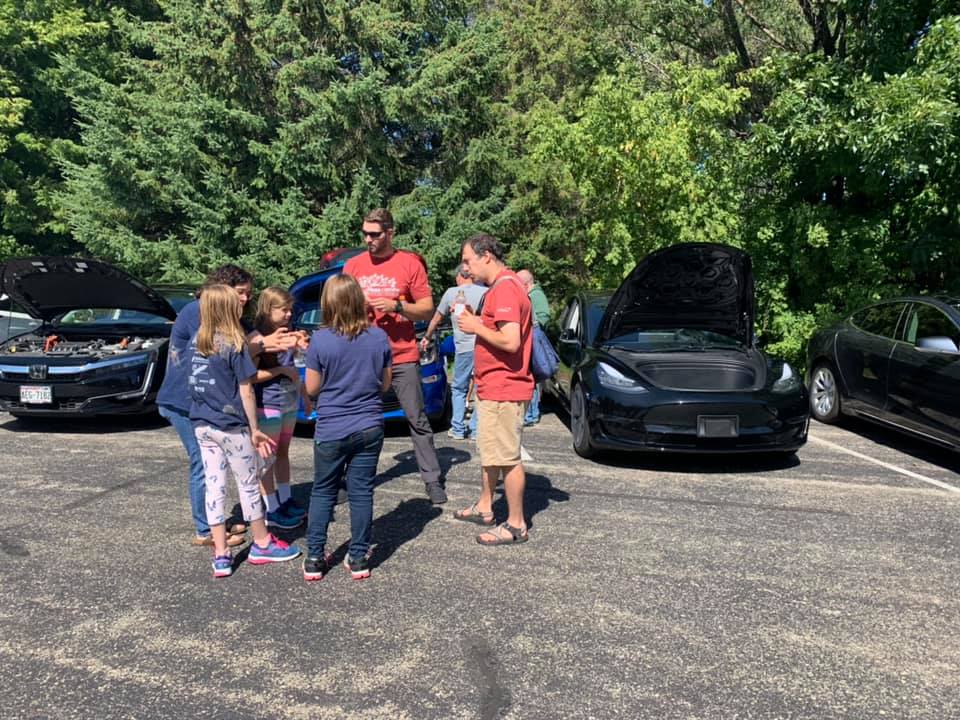
After lunch we saw small wind turbines at Essity (formerly SCA Tissue) right along the bike path. These 4 turbines were designed and installed by a former Wisconsin company called Renewegy (which is unfortunately no longer in business). Next we headed to Heckrodt Wetland Reserve in Menasha where we learned about their tremendous efforts to preserve this part of the state and how solar power is a sustainable part of their growth.
We next saw an innovative solar carport at the Petit and Dommershausen law offices in downtown Menasha, where were treated to a much-needed snack. Then we biked to RiverHeath, which is a new development in Appleton right along the Fox River. Mike Barnett of HGA described an innovative use of geothermal energy, designed by HGA and installed by G.O. Loop, that uses the temperature of the water to provide heating and cooling to the new buildings in the RiverHeath complex.
Last, but certainly not least, we biked to the first power plant in Wisconsin that delivered electricity to a customer. We were greeted by “Thomas Edison,” a generous measure provided by the Appleton Historical Society, who helped explain the origins of the Vulcan Street Hydropower Plant which was put into service in 1882 and provided electricity for lights at paper manufacturing plants as well as one home.
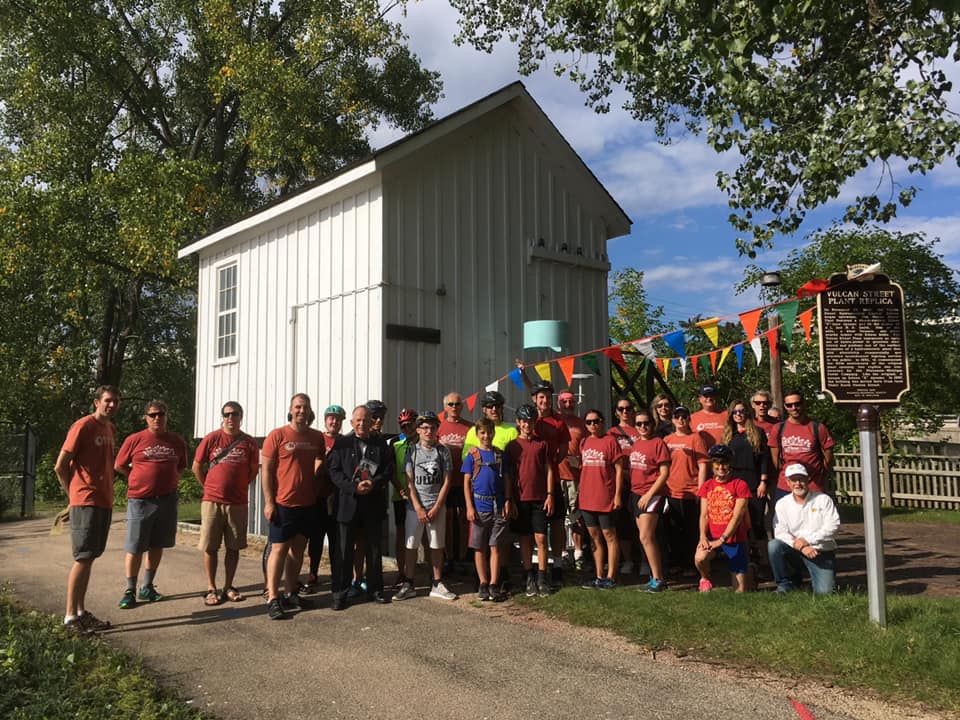
The actual Vulcan plant burned down in 1889. The Appleton Historical Society, as well as Ford Motor Company, contributed many hours and, in Ford’s case, equipment, to allow this replica of the original hydropower plant in Wisconsin to stand and to give visitors like us the opportunity to learn about Wisconsin’s energy history and see it in action.
Finally, we arrived back at Prairie Hill Park, where we enjoyed beer from Central Waters based in Amherst and celebrated a great event with our riders! The weather was outstanding, and we can’t wait to plan next year’s Ride with RENEW.
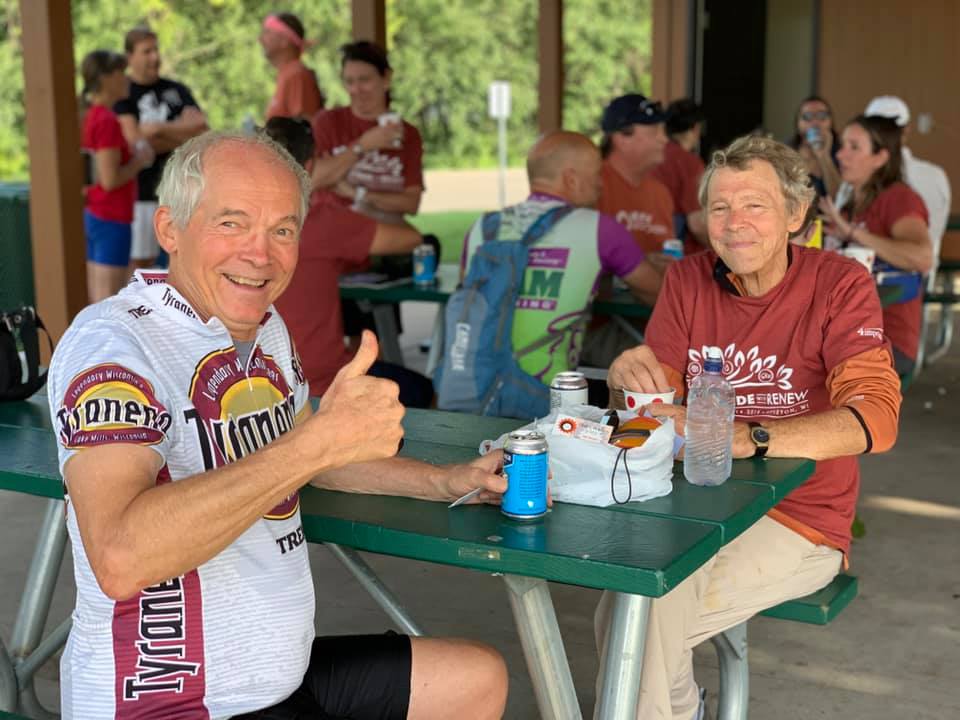
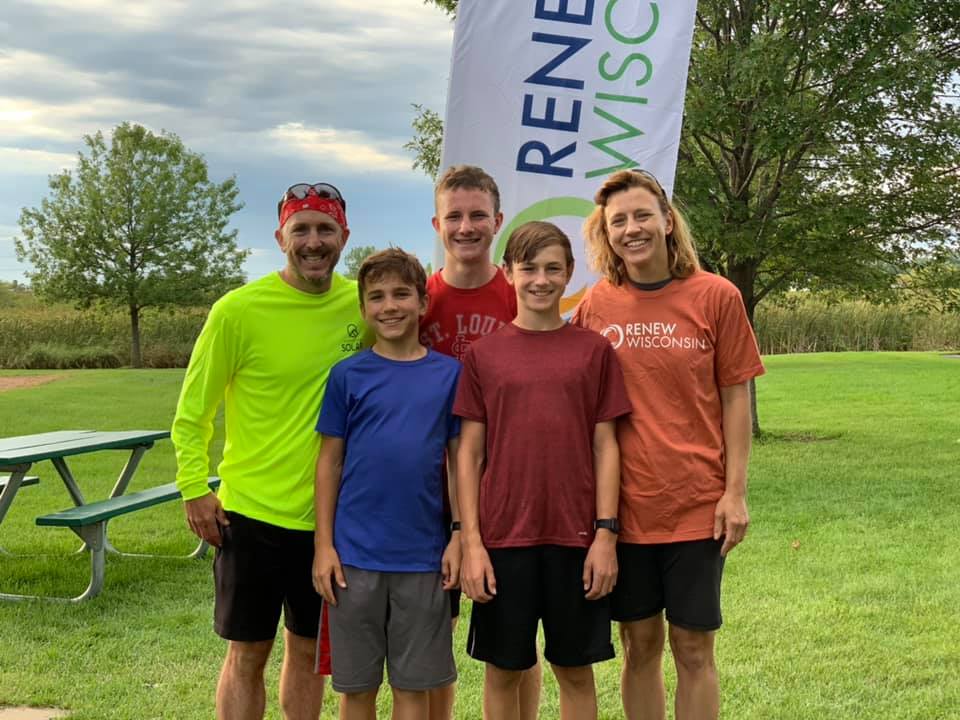
Four of RENEW staff members joined Board member Jim Funk of Energize LLC as he showed off one of Wisconsin’s earliest examples of “bi-facial” solar panels – panels that can receive light from both sides of the panel to create electricity. This installation at a carport has served as a beautiful visual example of solar energy in the Fox Cities since 2010. For example, check out the very cool design when our staff member Jim Boullion’s car was parked underneath the panels.
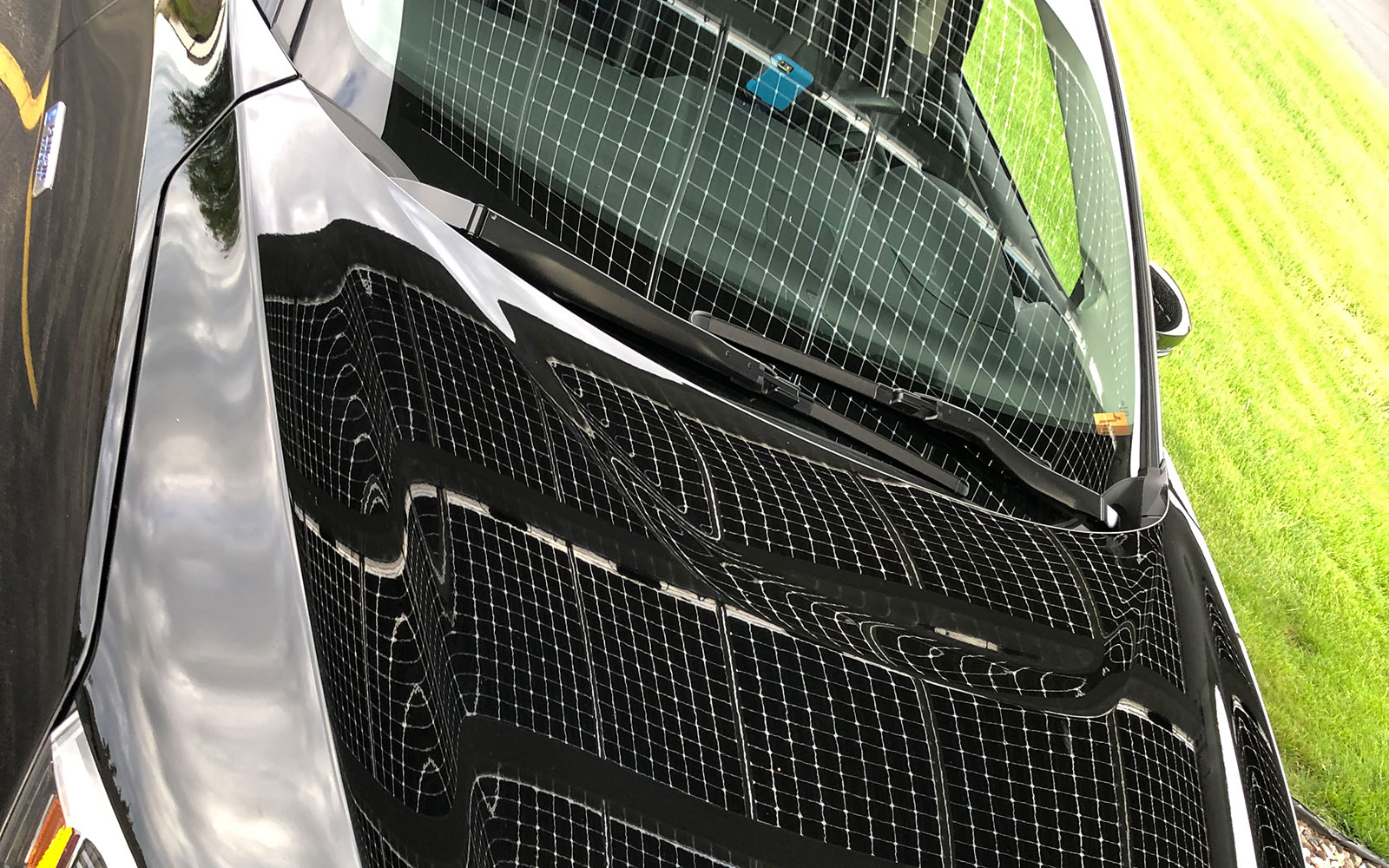
Check out our Facebook photo album to see more images of the ride!
Thank you again to all of our sponsors, shown below, all the bike riders, the Girl Scouts, Lego League, and everyone who donated to support our riders and helped us raise over $17,000 to continue our education, advocacy, and collaboration to advance renewable energy in Wisconsin!
2019 RIDE WITH RENEW SPONSORS

by Jodi Jean Amble | Sep 10, 2019 | Community, Electric Vehicles, Events, Geothermal, Hydroelectric, RENEW Wisconsin, Renewables, Solar, Solar for Good, Wind
Ride with RENEW to highlight area renewable energy projects.
On Saturday, September 14th, RENEW Wisconsin will host its 7th annual “Ride with RENEW” bicycle tour of renewable energy projects in Appleton, Grand Chute, Neenah, Menasha, and Fox Crossing, WI. All event proceeds support RENEW Wisconsin’s ongoing work to advance renewable energy in Wisconsin.
Riders will travel approximately 30 miles on paved roads and bike paths to visit solar, geothermal, wind, and hydropower energy generation facilities in the area. Riders can also participate in an electric vehicle “ride and drive” event as part of National Drive Electric Week.
Riders will depart from Prairie Hill Park at 9 AM. The total tour time will be approximately 7 hours (including stops at renewable energy sites) and actual riding time will be approximately 3 hours. Those not able or wanting to bike the ride can register as a non-biker and can use their own vehicles to transport themselves to the various tour stops.
Participants will get an inside look at some of the area’s leading renewable energy projects and will enjoy breakfast, lunch, and beverages along the way. They will visit with installers and workers who are advancing renewable energy every day, and hear from customers about why clean energy works for their businesses and communities.
The day’s tour will include stops at the following clean energy facilities:
- Gordon Bubolz Nature Preserve – The Gordon Bubolz Nature Preserve is a 700-acre facility used for recreation, conservation, and education. In July 2018, the nature preserve unveiled its new clean energy microgrid composed of solar panels, battery system, and software system.
- Evergreen Credit Union – With a mission to be the most environmentally responsible credit union in the nation, Evergreen Credit Union installed a solar array at their Appleton facility. The solar array produces enough electricity to satisfy 85% of the credit union’s annual electricity demand.
- Electric Vehicle Ride and Drive at Schildt Park (Neenah) – As part of National Drive Electric Week, join RENEW Wisconsin and many Fox Valley sustainable businesses to learn about and test drive electric vehicles and electric bicycles. The event will overlap with Ride with RENEW’s lunch hour.
- Essity Wind Turbines – Essity is a global company that manufactures hygiene and health products. In 2007, Essity installed a 20 kW solar PV system, and in 2010, Essity installed four wind turbines that generate 80 kW of energy.
- Heckrodt Nature Preserve – Heckrodt Wetland Reserve, a Solar for Good grant recipient, is a 76-acre urban nature reserve. In 2018, Heckrodt installed a 19.6 kilowatt solar panel system to offset 5,000 pounds of CO2 emissions.
- Petit & Dommershausen, SC Law Offices – The Petit & Dommershausen Law Offices have embraced solar energy at their Menasha and Oshkosh locations. After installing a 20.7 kW solar carport array at their Menasha location in the fall of 2017, Petit & Dommershausen is offsetting approximately 81% of their Menasha office’s annual electricity usage.
- RiverHeath – RiverHeath Community is a vibrant apartment and retail area that was redeveloped from an urban brownfield site on the Fox River. Buildings utilize an innovative river based geothermal heating and cooling system that minimizes the site’s energy use and carbon intensity while reducing first costs compared to a conventional ground source geothermal system.
- Vulcan Street Plant – The Vulcan Street Hydroelectric Central Station, the world’s first Edison hydroelectric central station, began operation in 1882 in Appleton. The output of the original generator was about 12.5 kilowatts. In 1891, the plant burned down, and a replica of the plant was later built on South Oneida Street.
- Schmidt Brothers Solar Canopy (add-on stop for non-bikers) – This 20kW Bi-Facial Solar Cantilevered Parking Canopy benefits from added generation from reflection below when snow covers the lot and when white or other light-colored vehicles park beneath it. The cantilevered design was specifically implemented to provide open and clear access to all parking spaces.
- The ride will conclude at Prairie Hill Park for refreshments at around 4:00 p.m.
Registration for the ride is open through September 14th. The cost is $45 for members of RENEW Wisconsin, $55 for non-members, and $75 to both register for the ride and become a member of the organization for one year. All donations to RENEW Wisconsin for this charity bike ride are matched up to $15,000 by generous donors John & Mary Frantz of Madison!
Individuals and businesses can donate to RENEW Wisconsin or in support of a rider, donate to RENEW to contribute towards a $15,000 matching donation, or volunteer on ride day.
“We are very excited to tour some of the Fox Cities’ great renewable energy projects on Saturday, September 14th,” said Tyler Huebner, Executive Director of RENEW Wisconsin. “This tour allows us to showcase a variety of ways to produce homegrown, clean energy right here in Wisconsin and for our team to engage with renewable energy advocates in the Appleton area. We’ll be learning about wind, solar, geothermal, and a hydropower plant that is part of renewable energy history as being the first electric production in Wisconsin. This is a really fun event where you can meet great people, help a good cause, and learn together about clean energy in Wisconsin.”
Sponsors of the Event include Eland Electric, Energize LLC, HGA, North Wind Renewable Energy Cooperative, Appleton Solar, Arch Electric, Clean Fuel Partners, G.O. Loop, Petit & Dommershausen, SC Law Offices, RiverHeath, Velocity, Wegner CPAs, 4imprint, Central Waters Brewing Company, Chain Reaction Cyclery, Glass Nickel Pizza Co., and Sturdy Bag Designs.
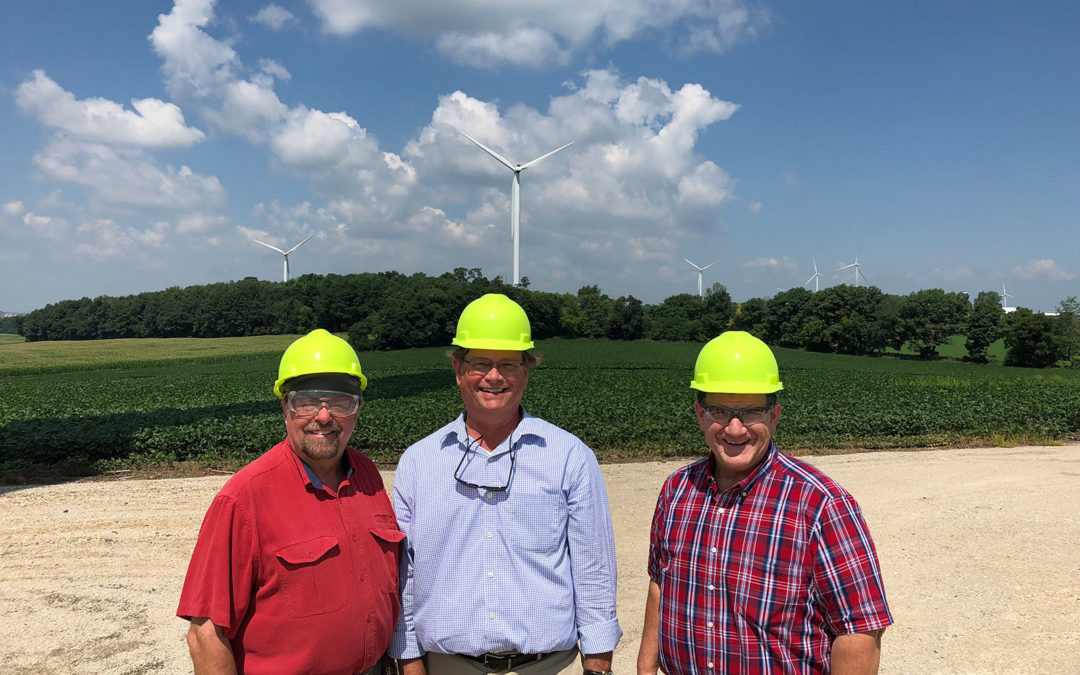
by Jim Boullion | Jul 30, 2018 | Events, Hydroelectric, RENEW Wisconsin, Renewables, Solar, Wind
Cedar Ridge Wind Farm
On July 24th Alliant Energy hosted a tour of their Cedar Ridge Wind Farm in Fond du Lac County for several state legislators to discuss not only wind, but all of the latest developments in renewable energy. Built in 2008, Cedar Ridge was one of the first wind installations in the state. Alliant Energy owns and operates this site of 41 turbines that has a capacity of generating 68 mW of electricity, enough to power 17,000 homes. In its 10 years of existence, Alliant calculates that the electric power generated by these wind turbines allowed them to avoid burning enough coal to fill a 99-mile-long coal train! Alliant currently owns 569 mW of total wind power, but because of falling costs, efficiency gains of the turbines, and inexpensive operations and management, they expect to invest in an additional 1,150 mWs of wind generation by 2021. Representatives Bob Kulp and Rick Gundrum came away impressed and posted very positive comments online about the tour and the many developments in renewable energy.
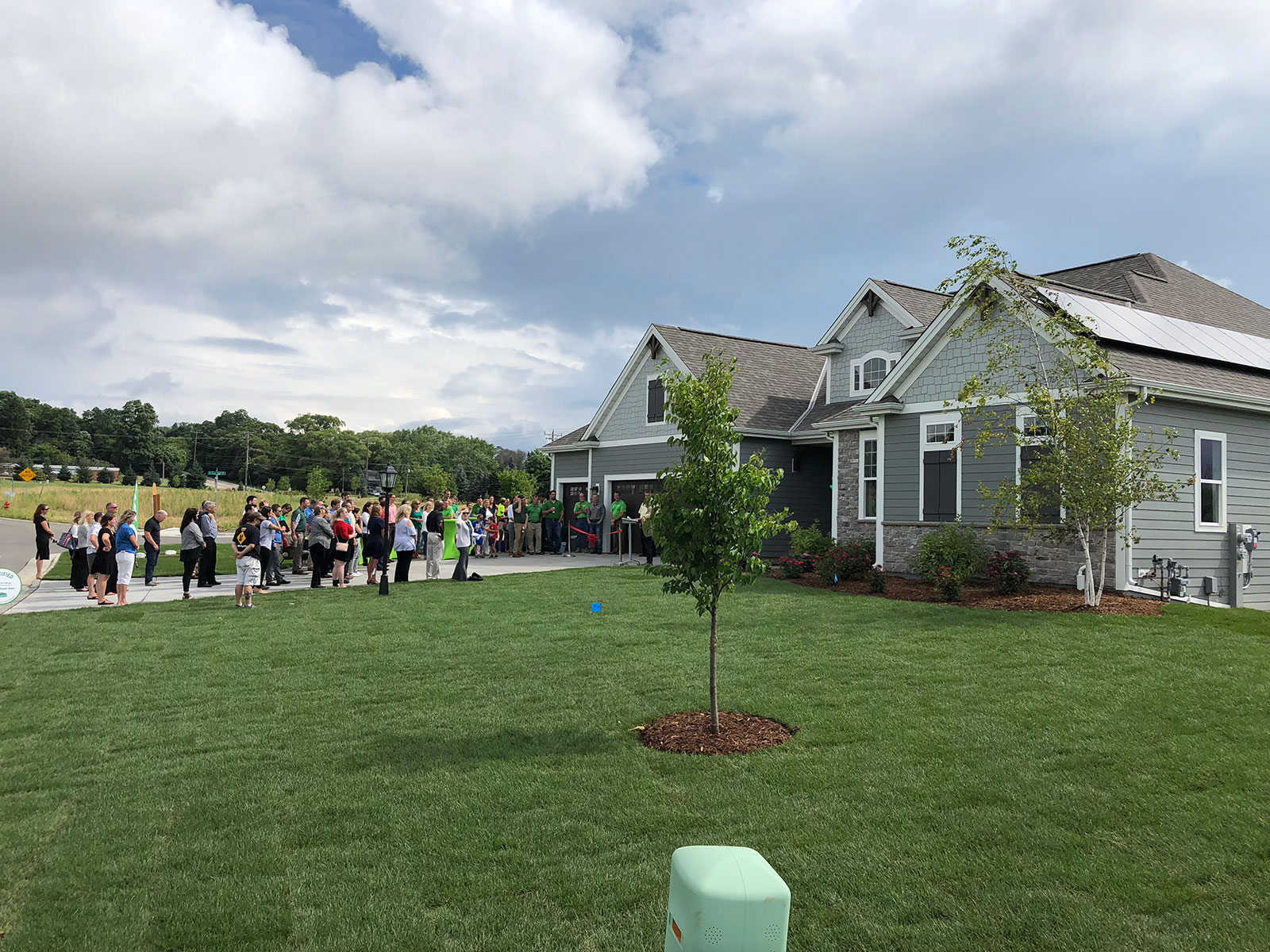
Tim O’Brian Homes Net Zero Community
On July 20th I visited a ribbon cutting for the new Tim O’Brian Homes Net Zero Community in New Berlin. This all-solar subdivision is the first of its kind in Wisconsin. In partnership with Neumann Companies and SunVest Solar, Inc., they are developing the Red Fox Crossing subdivision with a focus on sustainability and energy efficiency. Not only is every home in the subdivision designed from the ground up to include 6 to 8 kW photovoltaic solar arrays, but they are also certified ENERGY STAR® V3 National Qualified Homes. “Buyers are looking for ways to save on their true cost of homeownership,” says Angela Cooper, Milwaukee Division President of Tim O’Brien Homes. “The upfront costs of building a net zero home might be slightly more than a code-built home but the money saved in monthly utility bills results in an overall less expensive home.” The subdivision has been popular, with half of the 34 units already sold. “Red Fox Crossing has the potential to be the turning point in building a more sustainable community in Wisconsin, versus focusing on only one home at a time,” says Tim O’Brien, President of Tim O’Brien Homes. ”

Badger Hydroelectric Plant
On July 13th I joined State Senator Rob Cowles (District 2-Green Bay) and Representative Dave Murphy (District 56-Greenville) on a tour of the Badger Hydroelectric plant in Kaukauna. The visit was hosted by the Kaukauna Municipal Utility, a member of WPPI Energy. As noted in this WBAY news story, the visit was designed as a discussion about renewable energy of all kinds. Hydroelectric power was one of the first, and least expensive sources of electric power. The Kaukauna facility is 110 years old and had a major upgrade in 2013, giving it a capacity of 7 mW of power, up 40% from the capacity of its two old powerhouses. During the meeting we discussed the dropping prices for wind and solar power and the tremendous amount of renewable energy that is currently listed on the 4-year MISO planning queue. It was noted that WPPI Energy, Dairyland Power and the investor owned utilities are looking to close their coal burning power plants and invest in utility scale wind and solar projects. They are doing this because wind and solar cost less than coal and the rising customer demand for renewable energy. This competitive, market-driven demand for renewable energy has led Wisconsin to easily surpass the 10% Renewable Portfolio Standard (RPS) that was established by the state legislature in 2006, and shows no signs of slowing!

Governor Walker Helps Energy Bank Announce Renewable Energy Lighting
On July 9th I was invited by Energy Bank, Inc. to attend the unveiling of a new product called FUSION. Neal Verfuerth, owner of Energy Bank, invented this new lighting system that uses the DC power output from photovoltaic solar panels to directly energize LED fixtures – without conversion to AC. Governor Scott Walker gave the keynote speech where he said Wisconsin companies understand the need to keep their peak energy demand low and reduce the overall cost of energy to be economically viable. Walker said that businesses understand that “to be environmentally sustainable, you need to be economically sustainable”, and products like FUSION make that happen. The Governor was excited about innovative and high-tech companies like Energy Bank locating in Wisconsin, creating the new era technologies that will create jobs and attract millennial workers to Wisconsin. I had a few minutes to speak with both the Governor and Representative Paul Tittl (District 25-Manitowoc) at the end of the event about the exciting advancements and fast falling prices that renewable energy has had in the last few years. They were very interested and are looking forward to working with RENEW to help keep that momentum going.
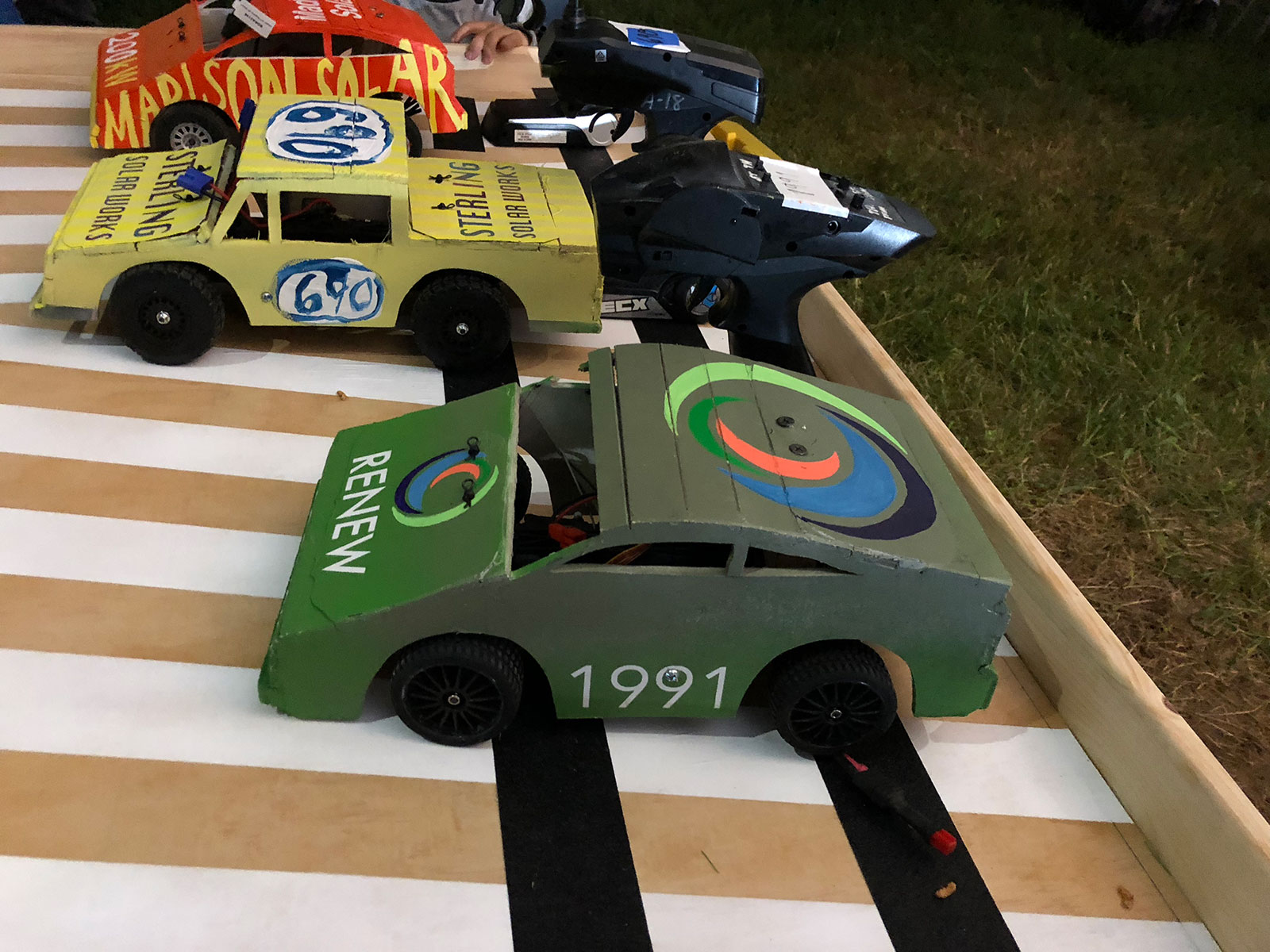
The 29th Annual Energy Fair
On the weekend of June 15-18 I had the pleasure of visiting the MREA Energy Fair in Custer. This was my first visit to the Energy Fair and all I can say is that I was blown away! They had an amazing number of great seminars (over 250) on renewable energy, energy conservation and sustainable practices of all kinds. I was able to see, sit in and learn about many different electric vehicles (over 70 of them were on-site) and discuss with EV aficionados what the exciting future of transportation might look like. There were also over 450 exhibitors, presenters and sponsors from around the country. There were great speakers, entertainment and interesting people everywhere you looked. Everyone was up-beat and excited about renewable energy and how quickly it is taking over the energy market. Finally, the most fun part of the weekend was having me drive the RENEW Wisconsin electric demolition derby car. I won my initial heat and was in the final event. A controversial call by the umpires and a slight miscalculation on my part kept me out of the winner’s circle, but at the end of the evening everyone was a winner and we all had a great time!!























